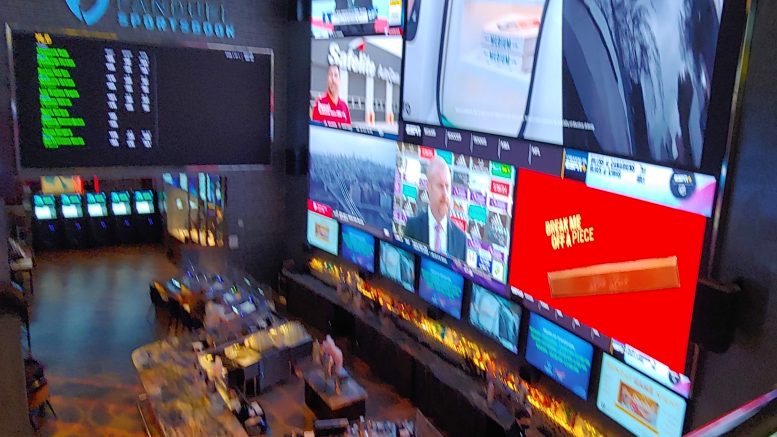Illinois increased its sports betting tax rate for the second time in as many years. The new tax adds a surcharge of $0.25 or $0.50 per wager, depending on the number accepted by an Illinois sportsbook. The rate starts at $0.25 per bet and increases to $0.50 after 20 million annual wagers.
FanDuel announced today that it will add a $0.50 fee on every wager made in Illinois. The new policy goes into effect on September 1, 2025. Other Illinois sportsbooks are expected to make similar pricing changes.
Update: On June 12, 2025, DraftKings announced the same $0.50 fee on every sports bet starting on September 1, 2025.
The new FanDuel $0.50 fee will be devastating to low-limit Illinois players. It substantially increases the house advantage of every bet.
How much Illinois FanDuel players will lose
There are two ways to calculate the additional costs for Illinois FanDuel bettors. One is based on the number of bets made per day. The other is the percentage of the bet.
Each FanDuel wager, regardless of type or size, will be hit with a $0.50 fee. That adds up quickly. The list below shows how much a player making a certain number of bets per day on average will lose in a 365-day year.
- 1: $182.50
- 2: $365
- 3: $547.50
- 4: $730
- 5: $912.50
- 6: $1095
- 7: $1277.50
- 8: $1460
- 9: $1642.50
- 10: $1825
- 15: $2737.50
- 20: $3650
- 25: $4562.50
- 30: $5475
- 40: $7300
- 50: $9125
- 75: $13,687.50
- 100: $18,250

How does the new fee increase the house edge of straight bets?
Straight bets have he lowest house edge of all types of sports wagers. This $0.50 fee increases the hold. The house advantage on a -110 bet is 4.55%. The numbers below show the amount in action and divided by the amount, including the dead $0.50 fee.
While it is unknown how this will be implemented, US Casino Advantage assumes the $0.50 fee will be added on the bet confirmation screen. This assumption is made because FanDuel appears to want bettors to understand why this is occurring in the hopes that players will contact their state lawmakers and demand the tax be repealed. The numbers below add the $0.50 fee to the wager.
$1 straight bet
FanDuel’s minimum bet in Illinois is $1. The hold on a typical $1 -110 straight bet is $0.045. The $0.50 fee on this bet increases that to $0.545, for a hold of 36.3% when including the extra $0.50 fee, making it a $1.50 wager that pays $0.91. The moneyline equivalent is -165.
$5 straight bet
The standard house edge on a -110 $5 straight bet is $0.227. That is a house advantage of 4.55%. A $5 bet is actually $5.50 due to the dead $0.50 fee. By taking the $0.727 and dividing it by $5.50, the house edge on a $5 bet at FanDuel in Illinois becomes 13.21%, almost triple that of a -110 wager. The moneyline equivalent is -127.
The table below shows how the $0.50 Illinois FanDuel fee affects the house edge and the comparable moneyline for common bet sizes from $1 up to $100. It includes the new house edge when adding the $0.50 fee to the wager and the adjusted moneyline equivalent.
| Bet Amount | House Edge With $0.50 Fee | Moneyline Equivalent |
|---|---|---|
| $1 | 36.33% | -165 |
| $5 | 13.21% | -127 |
| $10 | 9.09% | -120 |
| $15 | 7.62% | -117 |
| $20 | 6.87% | -115 |
| $25 | 6.41% | -114 |
| $50 | 5.49% | -112 |
| $100 | 5.01% | -111 |
The $100 bet is actually -110.6, rounding up to -111. This means once bets get slightly over $100, it rounds down to the standard -110.
Parlays are not the solution
The $0.50 fee also applies to parlays. It may be tempting to avoid the $0.50 fee on several straight bets by putting it all into one parlay. That is likely to cost more money in the long run.
If a $10 two-team parlay holds 10%, the $0.50 fee increases the house edge to 14.29%. This shows that making two $5 straight bets at 13.21% is better than placing a $10 two-team parlay at 14.29%.
A $20 two-team parlay holds 12.2% in this scenario. Players are better off with two straights at $10 each with a 9.09% negative expectation than making a $20 two-team parlay that holds 12.2%.
The house advantage grows substantially with each leg added to the parlay. US Casino Advantage found no scenario where turning straight bets into parlays equaling the same amount provides a beneficial workaround for the $0.50 fee.
Illinois will drive sports bettors away with its new tax
Politicians often think that raising taxes will generate more revenue. However, higher prices reduce demand. This has been shown in other sin taxes, and sports betting is no different.
About three-quarters of Illinois residents live near a state line. Chicago borders Indiana, which has legal mobile and retail sports betting with a low tax rate. East St. Louis is across the Mississippi River from Missouri, which launches sports betting on December 1, 2025. Bettors in these areas can easily visit these states to save money. Offshore sportsbooks and neighborhood bookies are happy to take action lost due to the counterproductive Illinois tax increase.
Licensed sportsbooks may find ways around the tax. This includes sweepstakes or exchange models. Neither pays gaming taxes.
Illinois may realize its mistake and repeal the misguided tax on each bet. Until then, recreational bettors who often play responsibly with small wagers will pay the biggest price.

